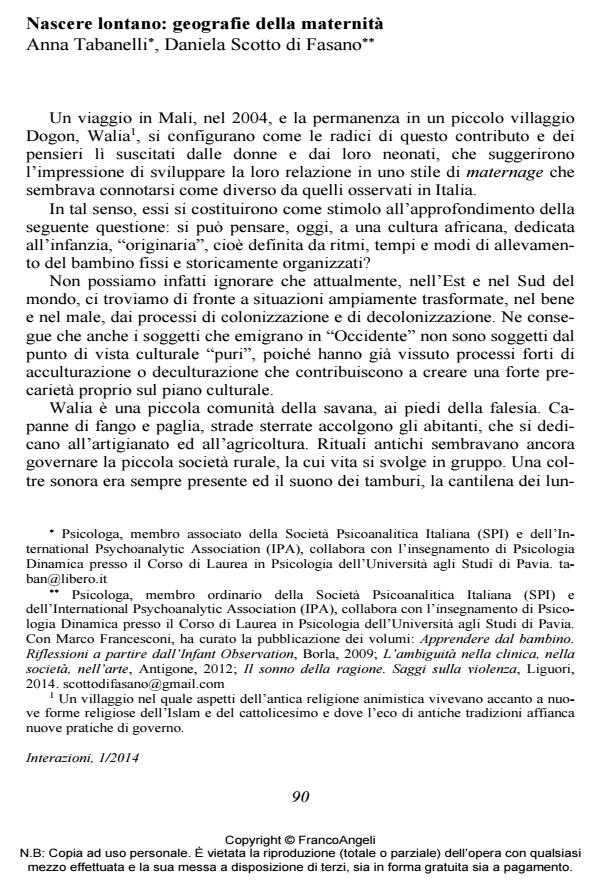Being born far away: geographies of maternity
Journal title INTERAZIONI
Author/s Anna Tabanelli, di Fasano Daniela Scotto
Publishing Year 2014 Issue 2014/1
Language Italian Pages 13 P. 90-102 File size 59 KB
DOI 10.3280/INT2014-001008
DOI is like a bar code for intellectual property: to have more infomation
click here
Below, you can see the article first page
If you want to buy this article in PDF format, you can do it, following the instructions to buy download credits

FrancoAngeli is member of Publishers International Linking Association, Inc (PILA), a not-for-profit association which run the CrossRef service enabling links to and from online scholarly content.
A journey to Mali in 2004 and a stay in Walia lay the foundations for this work. The women and the infants we met apparently developed their relationship in a different style of maternage. This experience led us to wonder whether it is still possible to think of an African “original” culture of childhood, defined by rhythms, times and patterns of breeding which are invariable and historically organized. It is common knowledge that colonization and decolonization processes deeply transformed the condition of the East and South of the world for better or for worse. Taking the afore-mentioned preconditions into account, we tried to understand what is the specific meaning of being born in a foreign land. As a consequence, one of the seminars on Infant Observation organized by the University of Pavia was devoted to the observation of babies born in African Muslim families residing in Pavia. Relying upon the Infant Observation method, we decided not to choose any a priori hypothesis but to explore the field and «assess how much "cultures" have an influence on body and psyche so to create "unique" forms of humanity, which actively interact with the genetic or phylogenetic components (more transculturally shared), modified themselves by the complexity of the intervening factors» (Lombardozzi, 2013).
Keywords: Mothering, portage, infant observation, migration, co-mother.
- Abbal T. (2006). Dinamiche familiari e insuccesso scolastico dei figli delle famiglie migranti. Possibilità di intervento nel campo della prevenzione e della clinica In: Dal Verme S., Facchetti B. (a cura di). Quaderni di Formazione alla Clinica Transculturale.
- Ainsworth M.D. (1967). Infancy in Uganda – Infant Care and the Growth of Love. Baltimore: The John Hopkins Press. Anzieu D. (1985). L’Io-pelle. Roma: Borla, 1994.
- Beneduce R. (2004). Frontiere dell’identità e della memoria. Etnopsichiatria e migrazioni in un mondo creolo. Milano: Franco Angeli.
- Beneduce R. (2007). Sofferenza mentale e alterità fra storia, dominio e cultura. Roma: Carocci.
- Bick E. (1968). L’esperienza della pelle nelle relazioni oggettuali. In: Melanie Klein e il suo impatto sulla psicoanalisi oggi. Roma: Astrolabio, 1995.
- Coppo P. (2013). Le ragioni degli altri. Milano: Cortina.
- Freud S. (1922). L’Io e l’Es. In: OSF, 9. Torino: Bollati Boringhieri.
- Lombardozzi A. (2013). Comunicazione personale.
- Maiello S. (2009). L’Infant Observation e la dimensione culturale. In: Francesconi M., Scotto di Fasano D. (a cura di), Apprendere dal bambino. Riflessioni a partire dall’Infant Observation. Roma: Borla.
- Parin P., Morgenthaler F. (1966). Les blancs pensent trop. Paris: Payot.
- Parin P., Morgenthaler F., Parin-Matthey G. (1971). Temi il prossimo tuo come te stesso.
- Milano: Feltrinelli, 1982.
- Preta L. (2008). Editoriale, Psiche, 1: 7-16.
- Rebuffoni C. (2012). Il contenimento materno in ambito interculturale. Il “pagne” africano attraverso lo sguardo dell’Infant Observation. Tesi di Laurea, Corso di Laurea Magistrale in Psicologia, Relatore M. Francesconi, a.a. 2011-2012.
- Sandri R. et al. (2012). Observer un bébé au Sénégal entre mauvais oeil et mauvaise langue. Relazione letta al 9° Congresso Internazionale sull’Osservazione del Bambino, Dakar, 29 ottobre – 3 novembre 2012 (in corso di stampa).
- Tabanelli A. et al. (2009). Radici e trasformazioni: un’esperienza di osservazione con donne africane. In: Francesconi M., Scotto di Fasano D. (a cura di), Apprendere dal bambino. Riflessioni a partire dall’Infant Observation. Roma: Borla.
- Tabanelli A., Antoniazzi D, Camandola A., Curone L., Di Pietro M., Omassi E., Rebuffoni C., Scotto di Fasano D., Sessa L., Vimercati E., Francesconi M. (2012). Esplorazioni: essere genitori in terra straniera. Relazione presentata al 9° Congresso Internazionale sull’Osservazione del Bambino, Dakar, 29 ottobre – 3 novembre 2012 (in corso di stampa).
- Tronick E. (1995). Touch in Mother-Infant Interaction. In: Field T.M. (ed.), Touch in Early Development. Mahwah (NJ) and Hove (UK): Lawrence Erlbaum Associates.
- Vallino D. (1991). Confronto tra il metodo classico dell’Infant Observation e la sua applicazione nei nidi e nelle scuole materne. In: Costantino A., Noziglia M. (a cura di), Osservazione del bambino e formazione degli educatori. Milano: Unicopli.
- Winnicott D.W. (1971). Gioco e realtà. Roma: Armando, 1974.
- Riflessioni sulla difficile esperienza di supporto psicologico a migranti richiedenti asilo Stefania Baraldo, Emma Luciani, Alida Martignon, Amalia Mineo, Mariadele Santarone, Anna Tabanelli, Stefano Trinchero, in INTERAZIONI 1/2022 pp.110
DOI: 10.3280/INT2022-001012 - Il perturbante Chiara Rosso, in INTERAZIONI 1/2021 pp.153
DOI: 10.3280/INT2021-001012
Anna Tabanelli, di Fasano Daniela Scotto, Nascere lontano: geografie della maternità in "INTERAZIONI" 1/2014, pp 90-102, DOI: 10.3280/INT2014-001008